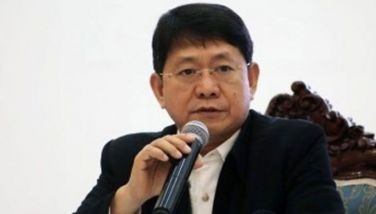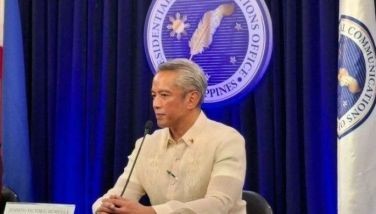Chinese investments in Philippines influenced by political leaders – group
MANILA, Philippines — As the Marcos administration diversifies its relationships and distances itself from Beijing, it is likely that future Chinese investments will mirror dynamics observed previously under the late former president Benigno Aquino III, according to a United States research group.
AidData, an independent US research institution, presented the findings of their research that analyzed China’s engagement and development of finance projects in the Philippines.
“What is significant about looking at China’s investments in the Philippines is, it’s highly responsive to bilateral relationships between Manila and Beijing and you see a lot of difference in how China has engaged with the Philippines depending on who is in power,” Samantha Custer, AidData director for policy analysis, said at a media briefing in the US embassy in Manila.
AidData noted that under President Marcos, there has been a shift in regional alliances, with the Philippines assuming a more assertive stance toward China amid heightened tensions over Beijing’s maritime claims and increasing engagement with neighboring Australia and Japan.
“This could mean fewer new big-ticket infrastructure projects, but it could also signify a rise in small-scale public diplomacy efforts to cultivate sympathetic interlocutors across educational institutions, media outlets, local government units and the political opposition,” AidData said.
China’s appetite to finance Philippine development is erratic and heavily influenced by its relations with political leaders in Manila.
Beijing bankrolled the Arroyo and Duterte administrations and fast-tracked new projects at an unprecedented rate under former president Rodrigo Duterte.
Frosty relations with the Aquino administration extended to declining interest in collaborating on new projects and past agreements.
The Philippines is at a critical inflection point and considering a reset in its relationship with China.
AidData noted that “on the heels of president Duterte’s enthusiastic embrace of Beijing, relations between the two countries have since become strained in the early days of President Marcos’ administration.”
China committed financing to 233 projects in the Philippines between 2000 and 2022, worth roughly $9.1 billion, with 91 percent of the financing in the form of debt (high-interest loans) instead of aid.
The research findings showed that “even at the apex of diplomatic relations between the two countries, for every $1 of aid Beijing gave to the Philippines in 2016, it issued $167 in debt. By 2019, the terms were worse: $1 of aid for every $211 of debt.”
The research said China is “opportunistic” in ramping up financing to politically important localities such as the home regions of senior officials.
Davao received huge investments from China and 85 percent of those projects happened during the tenure of Duterte.
“The other thing that’s important to say about China’s investments in the Philippines is it has a particular focus. It’s very focused on infrastructure and infrastructure adjacent sectors, like dams, investments in physical connectivity, roads, rails, bridges and the like,” Custer said.
Roughly 55 percent of its projects relied on Chinese firms, often state-owned enterprises, associated with elevated exposure to environmental, social and governance risk or questionable business practices that were directly or indirectly sanctioned by the World Bank or Asian Development Bank.
- Latest
- Trending



























